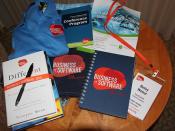Hawkins, Carole C., (2001, March). Beyond the Sole Proprietorship. Home Office Computing, v19 i3 p68. Retrieved October 03, 2002, from INFOTRAC database on the World Wide Web: http://web4.infotrac.galegroup.com/itw/session/
The author examines sole proprietors and operators of home based businesses and attempts to find out whether they should continue as sole proprietorships, incorporate, or form a partnership.
The author suggests that home businesses should always consult with a lawyer prior to making any decisions. Some of the advantages of sole proprietorships are that they are easy and relatively inexpensive to start up and the owners are able to report their losses on personal income taxes. However, the downside to operating a sole proprietorship is the owner has unlimited liability and can be held personally responsible for all business debts. Also, sole proprietors often have trouble raising capital, which is necessary for expansion and growth of a business.
According to 1997 figures posted by the IRS, sole proprietorships represented 75 percent of the approximate 24 million businesses in the United States.
Anyone who works for himself or herself would be considered a sole proprietor once they choose a business name and obtain a business license.
According to Kerry Branch, who is a specialist in business and corporate law, there's no fixed point at which a home-based business owner should incorporate or form some type of entity to hold the business. "Choosing to incorporate depends mainly on one's long-range business plans. Whatever route a business owner chooses to take is not written in stone, changing to another structure if liabilities increase is possible."
The author observes the pros and cons of a regular corporation, limited liability company and general partnership and compares/contrasts them with the pros and cons of sole proprietorships. The author's research seems to correlate with the statements made...


